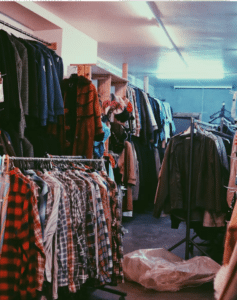Repairability, sustainability… How can we change our imagination to make sobriety desirable?


However, according to a survey carried out in 2023 by Ademe, the French are also ready to adopt other behaviors by reducing their consumption of material goods. But only if society puts sobriety back at the heart of collective action, by promoting repairability and sustainability.
The second-hand market, which a few years ago was still perceived in a negative light, is now seen as beneficial for the economy and the environment: its growth illustrates how changes in social representations can encourage the deployment of new consumer practices.
The same applies to sobriety, whose potential development implies profound changes in our imaginations and practices.


The second-hand market has grown considerably in recent years.
Sobriety is opposed to abundance and its corollary: the possibility of unlimited consumption and production of material goods, which are incompatible with planetary limits.
So how can we promote more sober forms of consumption without them being seen as social regression and synonymous with deprivation? How can we turn our backs on the objectives of growth and accelerated product renewal, while at the same time generating wealth in a different way?
If these questions are so sensitive, it’s because they touch on the individual, social and cultural representations at the foundation of our modern societies.
Making sobriety desirable by activating the lever of social imagination: this is the avenue we propose to explore in this article.
Changing our purchasing behavior means changing our relationship with consumer goods. To buy less and better, we need to promote a different relationship to time, to the possession and accumulation of material goods, and to the values, including symbolic ones, that are attached to things.
This means, for example, relearning how to maintain and repair objects to make them last longer. Taking the time to clean your toaster may seem trivial, but when you consider that 70% of breakdowns are due to crumbs getting stuck in the appliance, it’s not a pointless exercise.
The same applies to our clothes, whose main sources of separation and renewal are wear and tear. Mending or personalizing them helps us to wear them longer and increase their emotional durability through a phenomenon of attachment.
Contrary to what the preceding examples suggest, changing our relationship with objects is far from being a matter of individual responsibility and personal consumer choice alone.
It’s about systemic change, a change that calls into question the commercial strategies employed for decades by manufacturers and distributors, which enhance the value of new products and continually feed our desire to replace them.
These strategies permeate our collective imaginations, and even today contribute to devaluing traditional practices aimed at making our objects last.
The controversy surrounding Ademe’s campaign on “unscramblers” is partly explained by the fact that our markets are still dominated by imaginations of mass consumption, often reinforced by practices of aesthetic and marketing obsolescence.
It is now necessary to influence the way in which all players (consumers, distributors, producers) perceive the market, which implies a symbolic construction work aimed at reinforcing the legitimacy of sober consumption practices. To achieve this, it is necessary to act on the anthropological structures of the imaginary, such as the myths, narratives, symbols and beliefs of the players.
Manufacturers and distributors have a crucial role to play here. By developing new commercial offers that are not based on volume, and by promoting these offers, they help to convey the idea that a more sober world is both possible and desirable.
Strategies centered on the design of repairable and durable products, coupled with maintenance and repair services, or the economy of functionality (product/service systems), although still few in number today, are promising.
In addition to extending the life of products and intensifying their use, they are sowing seeds in the minds of all concerned: consumers, who see other prospects than replacing their products, but also other market players, who are becoming aware that a more resource-efficient activity can prove economically viable.
Acting on the structures of the imaginary by promoting discourse favorable to sober practices is a necessary, but not sufficient, condition for bringing about changes in behavior. We also need to design socio-technical systems to support changes in practices.

Let’s take the case of repairs. Consumers’ behavior is significantly influenced by the price they pay, and guided by a symbolic logic based on the image they wish to project to society, to their loved ones and to themselves. But the repair time, the convenience of the service, the comfort, the guarantee of good working order and the quality are all other essential elements in the customer’s eyes.
Encouraging repair therefore requires the development of what sociologist Lucien Karpik calls “trust systems”, which aim to reassure consumers about the quality of repair activities.
These measures can take a variety of forms: labels, guides or technical standards that aim both to make up for consumers’ lack of information about repairers and to avoid opportunistic behavior on the part of unskilled and/or scrupulous repairers.
On a national scale, we could envisage the creation of a repair observatory, which would provide information on qualified players, comparisons on the reparability of products and brands, and indicate average lead times or price ranges. This would not only improve practical access to these activities, but also their image.
In order to encourage people to adopt new habits, this work must be the result of a collective approach involving public authorities, producers, distributors and consumer associations. In recent years, material supply shortages, inflation and longer delivery times have shown that sobriety is a major issue. It’s a sine qua non if we are to increase the resilience of our societies and make a success of the ecological transition.
This article is based on research carried out with the Mines urbaines chair.